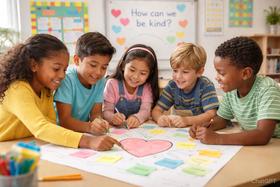For the 2026 school year, there are 3 public schools serving 782 students in Columbia (Walla Walla) School District. This district's average testing ranking is 1/10, which is in the bottom 50% of public schools in Washington.
Public Schools in Columbia (Walla Walla) School District have an average math proficiency score of 16% (versus the Washington public school average of 41%), and reading proficiency score of 36% (versus the 53% statewide average).
Minority enrollment is 47% of the student body (majority Hispanic), which is less than the Washington public school average of 52% (majority Hispanic).
Overview
This School District
This State (WA)
# Schools
3 Schools
2,561 Schools
# Students
782 Students
1,101,855 Students
# Teachers
53 Teachers
62,269 Teachers
Student-Teacher Ratio
15:1
15:1
Student By Grade
District Rank
Columbia (Walla Walla) School District, which is ranked within the bottom 50% of all 306 school districts in Washington (based off of combined math and reading proficiency testing data) for the 2022-2023 school year.
The school district's graduation rate of 85% has increased from 70-74% over five school years.
Overall District Rank
#278 out of 307 school districts
(Bottom 50%)
(Bottom 50%)
Math Test Scores (% Proficient)
16%
41%
Reading/Language Arts Test Scores (% Proficient)
37%
53%
Science Test Scores (% Proficient)
40-44%
49%
Graduation Rate
85%
84%
Students by Ethnicity:
Diversity Score
0.54
0.69
% American Indian
1%
1%
% Asian
n/a
9%
% Hispanic
43%
26%
% Black
1%
5%
% White
53%
48%
% Hawaiian
n/a
2%
% Two or more races
2%
9%
All Ethnic Groups
District Revenue and Spending
The revenue/student of $17,315 in this school district is less than the state median of $18,799. The school district revenue/student has stayed relatively flat over four school years.
The school district's spending/student of $16,247 is less than the state median of $19,250. The school district spending/student has stayed relatively flat over four school years.
Total Revenue
$14 MM
$20,715 MM
Spending
$13 MM
$21,212 MM
Revenue / Student
$17,315
$18,799
Spending / Student
$16,247
$19,250
Best Columbia (Walla Walla) School District Public Schools (2026)
School
(Math and Reading Proficiency)
(Math and Reading Proficiency)
Location
Quick Facts
Rank: #11.
Columbia High School
(Math: 11-19% | Reading: 40-49%)
Rank:
Rank:
2/
Bottom 50%10
787 Maple Street
Burbank, WA 99323
(509) 545-8573
Burbank, WA 99323
(509) 545-8573
Gr: 9-12 | 223 students Student-teacher ratio: 16:1 Minority enrollment: 52%
Rank: #22.
Columbia Middle School
(Math: 10-14% | Reading: 40-44%)
Rank:
Rank:
2/
Bottom 50%10
835 Maple Street
Burbank, WA 99323
(509) 545-8571
Burbank, WA 99323
(509) 545-8571
Gr: 6-8 | 184 students Student-teacher ratio: 15:1 Minority enrollment: 50%
Rank: #33.
Columbia Elementary School
(Math: 20-24% | Reading: 25-29%)
Rank:
Rank:
2/
Bottom 50%10
977 Maple Street
Burbank, WA 99323
(509) 547-9393
Burbank, WA 99323
(509) 547-9393
Gr: K-5 | 375 students Student-teacher ratio: 14:1 Minority enrollment: 43%
Frequently Asked Questions
How many schools belong to Columbia (Walla Walla) School District?
Columbia (Walla Walla) School District manages 3 public schools serving 782 students.
What is the rank of Columbia (Wallalla) School District?
Columbia (Wallalla) School District is ranked #278 out of 306 school districts in Washington (bottom 50%) based off of combined math and reading proficiency testing data for the 2022-2023 school year.
What is the racial composition of students in Columbia (Wallalla) School District?
53% of Columbia (Wallalla) School District students are White, 43% of students are Hispanic, 2% of students are Two or more races, 1% of students are American Indian, and 1% of students are Black.
What is the student/teacher ratio of Columbia (Wallalla) School District?
Columbia (Wallalla) School District has a student/teacher ratio of 15:1, which is lower than the Washington state average of 18:1.
What is Columbia (Wallalla) School District's spending/student ratio?
The school district's spending/student of $16,247 is less than the state median of $19,250. The school district spending/student has stayed relatively flat over four school years.
Recent Articles

Helping Your Child Navigate Friendship Drama at School
Meta Description: Practical 2026 strategies for helping your child navigate friendship drama at school with confidence, empathy, and resilience.

Raising Kind Kids: Public Schools and Empathy
Discover How Public Schools Teach Empathy and Character Education through SEL, service learning, and restorative practices in 2026.

Do We Still Need Libraries in Public Schools in 2026
An updated look at the role of public school libraries in 2026, their impact on literacy, equity, and digital learning, and why they remain essential today.





